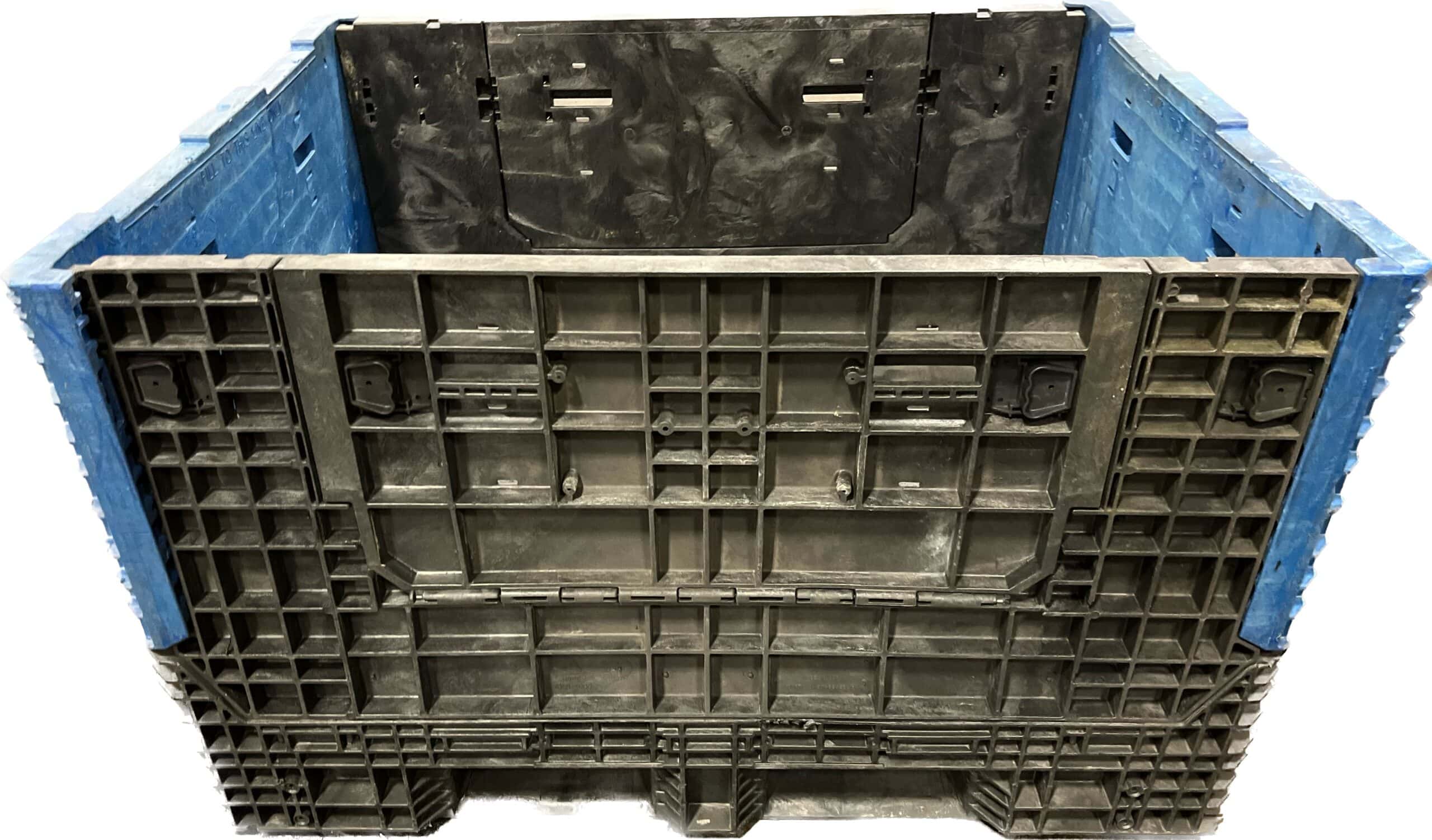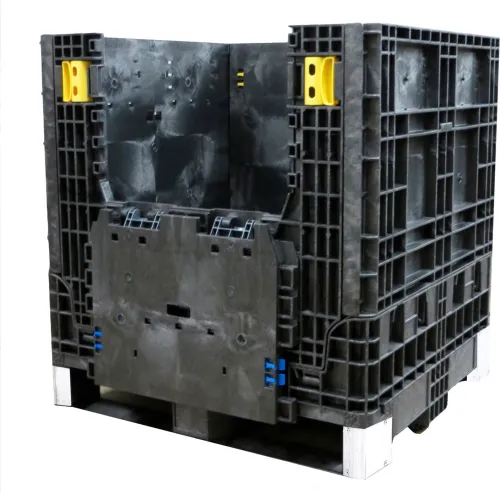Why refurbished bulk containers are eco-friendly solutions for sustainable businesses
The Ultimate Guide to Choosing the Right Bulk Containers for Your Company Demands
Picking the suitable mass containers is crucial for any type of company that counts on efficient logistics. Various sorts of containers exist, each made for certain products and applications. Variables such as dimension, product compatibility, and regulatory requirements play a considerable duty in this decision-making procedure. Understanding these aspects can result in enhanced operational performance. Lots of businesses forget necessary aspects that might enhance their total efficiency and sustainability. What are these considerations?
Understanding Various Sorts Of Mass Containers
Bulk containers act as crucial devices for organizations seeking efficient storage and transport options. These containers come in numerous types, each created to satisfy details functional demands. One common kind is the intermediate bulk container (IBC), which is suitable for fluid and granulated products, offering a balance of capability and ability to move. Another preferred alternative is the mass bag, or FIBC, appropriate for completely dry, flowable items. These adaptable containers are lightweight and can be quickly delivered and kept. For larger products, rigid mass containers are typically utilized, giving longevity and security for risk-free handling. In addition, there are customized containers customized for unsafe products, making sure compliance with safety laws. Understanding the distinctive features of these bulk container kinds enables businesses to make enlightened choices that optimize logistics and decrease costs. By picking the appropriate container, companies can enhance their operational efficiency and enhance their supply chain procedures.
Key Product Considerations for Mass Containers
When choosing bulk containers, it is important to consider the materials made use of in their building. Factors such as stamina, toughness, and chemical compatibility play an important function in making certain the containers fulfill specific functional requirements. Additionally, weight and portability worries can impact both performance and transport logistics.
Product Resilience and Stamina
Longevity and strength are essential aspects in picking products for mass containers, as they straight influence the container's ability to withstand numerous environmental conditions and taking care of processes. Products such as high-density polyethylene (HDPE), polypropylene, and stainless steel are frequently favored for their robust buildings, offering resistance to impact, temperature level, and abrasion variations. The option of product likewise influences the general life-span of the container; more powerful products normally lead to much less constant replacements, leading to cost financial savings with time. Additionally, the weight of the product can impact delivery prices and convenience of handling. Businesses have to consider their details operational atmospheres and the possibility for damage to assure peak resilience and stamina in their bulk container option.
Chemical Compatibility Aspects
Comprehending chemical compatibility is important for selecting mass containers, as the products used should resist the certain materials they will hold. Various variables affect compatibility, including the chemical nature of the materials, temperature, and duration of storage. Destructive chemicals may require containers made from stainless steel or specialized plastics that resist destruction. In addition, responsive substances can produce heat or gases, necessitating aired vent or pressure-rated containers. The choice of container product, whether polyethylene, polycarbonate, or metal, need to line up with the chemical residential or commercial properties of the kept compounds to avoid violations or leakages. Inevitably, a comprehensive analysis of these compatibility elements assures safe handling and storage, protecting both employees and the atmosphere while preserving item integrity.
Weight and Mobility Problems
Selecting bulk containers entails not only evaluating chemical compatibility but additionally thinking about weight and portability. Organizations have to examine the simplicity of handling and transport to optimize efficiency. Lightweight materials like high-density polyethylene (HDPE) or light weight aluminum can promote simpler motion and lower delivery costs. Conversely, much heavier containers might give boosted sturdiness but can impede wheelchair, specifically in settings needing constant relocation. In addition, the style of the container must enable for practical lifting and stacking, guaranteeing ergonomic security for employees. Companies ought to additionally think about the framework offered for transportation; for instance, containers suitable with forklifts or pallet jacks can streamline operations. Inevitably, the right balance between weight and portability straight affects operational efficiency and cost performance.
Sizing Your Bulk Containers for Optimal Performance
When sizing bulk containers, services must meticulously examine the measurements called for to suit their details items. In addition, weight capability is a critical variable that affects efficiency and safety throughout transportation and storage. Effective sizing not just takes full advantage of area yet likewise optimizes operational workflows.
Determining Container Dimensions
Selecting the right measurements for bulk containers is important for taking full advantage of performance in storage space and transportation. Services need to examine their details demands, considering aspects such as available area, the nature of the products being kept, and the methods of transport utilized. Accurate measurements ensure that containers fit preferably in vehicles and stockrooms, decreasing thrown away space and lowering taking care of time. Requirement dimensions can offer ease, however personalized measurements could be needed for distinct demands or to fit particular products. Furthermore, it is essential to assess stacking abilities and ease of access, as these aspects affect general functional efficiency. Ultimately, the ideal dimensions bring about improved organization and streamlined logistics, profiting the overall productivity of business.
Weight Capability Considerations
Recognizing weight capacity is vital for businesses aiming to enhance their mass container efficiency. The weight ability of a container directly impacts storage space capabilities, transportation logistics, and total functional costs. Choosing containers with the suitable weight restrictions ensures that companies can securely keep and transfer their items without running the risk of damages or compliance issues. Overwhelming containers can cause structural failures, while underutilizing capability lead to lost resources. When choosing containers, it is essential for companies to assess their item weights and consider any type of regulatory demands. Furthermore, factors such as the kind of material, meant usage, and environmental problems must also influence weight click site capability choices. By reviewing these aspects, companies can improve performance and guarantee a structured supply chain.
Regulative Compliance and Safety And Security Specifications

Governing compliance and safety standards play an important function in the selection of mass containers for businesses. Organizations should assure that their containers meet numerous laws established by regional, nationwide, and global authorities. These standards usually relate to product security, structural integrity, and appropriate labeling, which assist stop crashes and ensure the safe transportation of goods.
In addition, adherence to industry-specific standards, such as those from the Fda (FDA) or the Occupational Security and Wellness Management (OSHA), is important for companies handling unsafe materials or food. Non-compliance can cause penalties, legal issues, or damage to an organization's online reputation.
Companies should additionally take into consideration the container's compatibility with the materials being stored or transported to avoid contamination or chemical reactions (used collapsible bulk containers). To summarize, comprehending and carrying out governing conformity and security criteria is necessary for the reliable and responsible usage of bulk containers
Sustainability Options for Eco-Friendly Mass Containers

Business are also checking out choices made from recycled materials, which not just conserve sources however likewise support the recycling visit the website market. Technologies in style permit for lighter containers that require much less energy to transportation, further enhancing sustainability. By incorporating these environmentally friendly mass container alternatives, companies can demonstrate their commitment to ecological stewardship while meeting customer demand for sustainable techniques. This shift not just aids the world but can additionally boost brand credibility and client loyalty.
Cost-Effectiveness and Budgeting for Bulk Containers
While many businesses concentrate on sustainability, cost-effectiveness remains an essential factor when choosing mass containers. Organizations has to evaluate the preliminary purchase rate, along with long-lasting operational prices, to assure monetary stability. Factors such as reusability, upkeep, and toughness play a considerable function in determining overall expenses.
Investing in high-quality containers might yield greater ahead of time prices but can lead to financial savings with minimized replacement prices and lowered waste. In addition, services need to consider transportation expenses and storage space efficiency, as these can affect the total budget.

Often Asked Concerns
How Do I Determine the Right Container for Hazardous Products?
To establish the ideal container for dangerous products, one need to evaluate compatibility with the material, think about the container's material, check for regulative conformity, and evaluate ability and safety functions to guarantee correct handling and storage space.
Can Bulk Containers Be Custom-made for Particular Products?
Yes, bulk containers can be tailored for certain items. used collapsible bulk containers. Various attributes, such as product, design, and size, can be customized to meet unique requirements, guaranteeing suitable safety and effectiveness for transporting and keeping different products
What Is the Average Life-span of Different Mass Container Kind?
The average life-span of mass container kinds differs; plastic containers last 5-10 years, steel containers 10-20 years, and wooden containers usually last 3-7 years, depending upon usage, upkeep, and environmental conditions.
Exactly how Should I Tidy and Maintain Mass Containers?
To clean up and preserve bulk containers, one must routinely check for damages, get rid of deposit, laundry with proper detergents, rinse extensively, and assurance appropriate drying out before storage space. Adhering to maker guidelines boosts longevity and safety and security during use.
Exist Rental Choices for Mass Containers Available?
Yes, many business offer rental choices for bulk containers, offering versatility for organizations. These leasings Clicking Here can suit numerous needs, enabling business to handle supply successfully without the dedication of purchasing containers outright.
Longevity and toughness are critical elements in selecting products for mass containers, as they directly affect the container's capability to endure different environmental conditions and taking care of procedures. Recognizing chemical compatibility is vital for selecting bulk containers, as the products used have to stand up to the details substances they will certainly hold. Recognizing weight capacity is crucial for companies aiming to maximize their mass container efficiency. Governing conformity and safety requirements play an essential duty in the option of bulk containers for organizations. While many organizations focus on sustainability, cost-effectiveness continues to be a critical variable when picking mass containers.